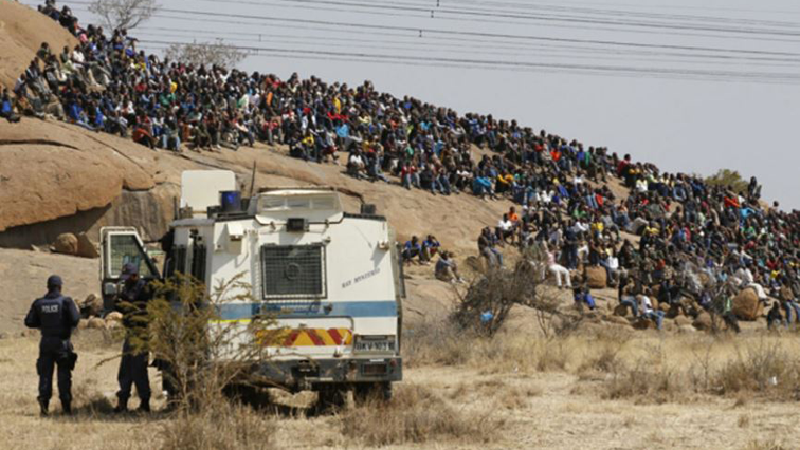On 16 August, 2012, a week of bloody clashes at the Lonmin platinum mine in the North West’s Marikana ended with police opening fire on a crowd of striking workers and killing 34 of them.
The most lethal use of state force in post-apartheid South Africa’s history, the Marikana massacre and the events leading up to it triggered global outrage at the time. Eight years on, the initial uproar appears to have settled to a din. To date, no one has been called to account for the events of 16 August, 2012.
Three days earlier, another skirmish between the authorities and the workers saw five people killed – workers Thembalakhe Mati, Phumzile Sokanyile and Semi Jokanisi, as well as SA Police Service Warrant Officers Tsietsi Monene and Ronnie Lepaaku. In 2018, murder charges were brought against six police officials, among them former North West deputy commissioner Major-General William Mpembe.
But when their trial finally got underway in the North West High Court this month, the gallery was empty.In 2014, the Marikana Commission of Inquiry, chaired by Judge Ian Farlam found the police’s “unreasonable and unjustifiable” use of teargas and stun grenades – allegedly under the instruction of Mpembe – on 13 August had been the catalyst for the lethal clash that day.
Mpembe is facing four counts of murder and five counts of attempted murder. His one-time colleagues, retired Colonel Salmon Vermaak, Constable Nkosana Mguye and Warrant Officers Katlego Sekgweleya, Masilo Mogale and Khazamola Makhubela, have each been charged with one count of murder.
e stand before Judge Tebogo Djadje this week.
Mushwana works in the Local Crime Record Centre and attended the scene on 13 August to take blood swabs and photographs. Defence lawyers painstakingly and technically questioned Mushwana, on certain aspects and observations of the crime scenes at the Lonmin K3 shaft, three days before the infamous massacre.
On Monday, he came under fire from Mpembe’s attorney, Jan Ellis, for not having photographed bloodied weapons. And yesterday, Vermaak’s advocate, Kobus Burger, questioned him about the cone settings and cartridge case findings at the crime scenes on 13 and 14 August, 2012.
Burger also asked Mushwana about the use of a metal detector when he was searching for cartridge cases. The officer explained that, when he was searching for cartridges, he was using his eyes and did not rely on the metal detector.
“Lieutenant-Colonel, I am putting it to you, that your answer doesn’t make sense,” Burger said. In reply, Mushwana said: “According to me, it’s possible [to look for cartridges using the eyes], because I was focusing on the whole area, not only where I collected the cartridge cases.”
Mpembe conceded the crime scene had not been fully cordoned off that day and that it had been left unmonitored for two months afterwards, prompting Burger to put it to him that: “If the integrity of one part of the scene is compromised, then it’s difficult to add any value to the rest of the scene.”
Burger read excerpts of Mushwana’s affidavit, highlighting his suggestions that there were crowds of officers moving in and out and that it appeared aspects of the scene had been tampered with. Ellis asked why Mushwana had not rectified a mistake in the numbering of the Crime Administration System (CAS) of the crime scenes.
Asked to give the CAS numbers of scene one and two, Mushwana said: “The first scene was Marikana CAS 115/8/2012 and the CAS for the second scene is 116/8/2012.”
Ellis replied: “If you look in column two, it’s CAS number 117; now we know from the evidence so far that is the scene at the bottom the river… So in your hand writing, you wrote 117, is that correct?”
Mushwana explained the reason for the numbering blunder was that, when he arrived at the police station to register the evidence, he was given “117” as the CAS number for the second scene, instead of 116.
When Ellis queried if the officer must have realised the mistake soon afterwards, he replied he only noticed it after sending through the exhibits. The court also heard evidence from a member of the Independent Police Investigative Directorate, who visited the scene that day and deposed to an affidavit.
Mpembe and his co-accused pleaded not guilty to the charges. The matter continues today.
source: The Citizen






 WhatsApp us
WhatsApp us 

